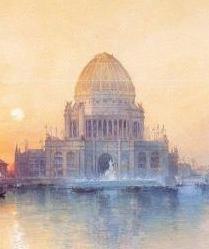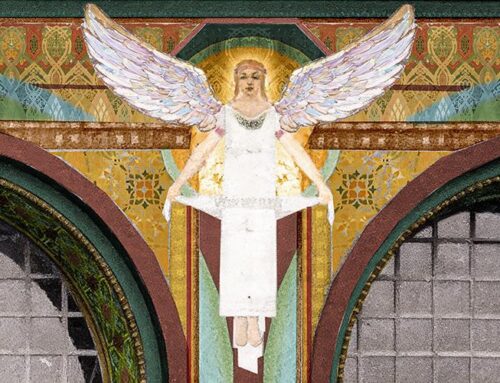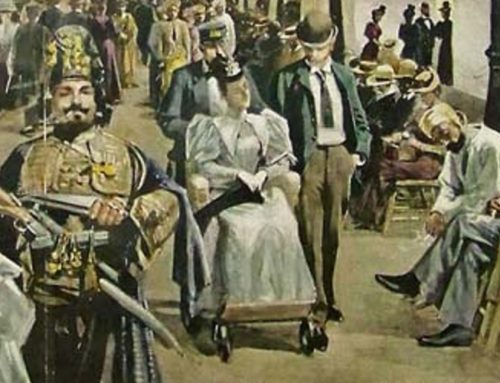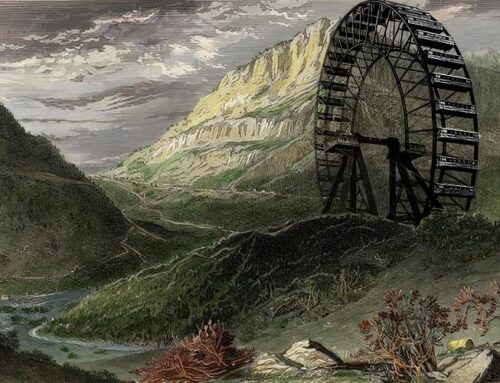Horace Tucker ran a tight ship. As Superintendent of the Department of Admissions for the 1893 World’s Columbian Exposition, Tucker had to account for every person who entered the fairgrounds. In order to pass through an entrance gate, everyone needed to supply either a ticket or a complimentary pass. Everyone.

A Special Pass to the 1893 World’s Columbian Exposition included the printed signature of Horace Tucker, Superintendent of the Department of Admissions. [Image from private collection.]
Adlai at the gate
On Tuesday, May 23, 20,440 people entered the fairgrounds using free admission passes and another 32,963 possessed a paid ticket, for a total attendance at the Fair of 53,376 people. It almost was 53,375. On that day, William T. Baker, ex-President of the World’s Columbian Exposition and current member of its Board of Directors, accompanied a guest to the fairgrounds in Jackson Park. Mr. Baker presented his pass and passed through the turnstile. His guest, however, had forgotten to bring his pass that day. In order to keep his job as gateman, Mr. Byron Bacon knew that he must follow the strict rules: no one enters the Fair without a ticket or a complimentary pass. No one. So, Mr. Bacon dutifully denied admission to the tall figure.
“Let this gentleman in at once,” demanded W. T. Baker angrily, as the guest looked on helplessly. The embarrassed guest was the Vice President of the United States, Adlai Stevenson.

Adlai Stevenson, Vice President of the United States (1893-97), visited the 1893 World’s Fair in Chicago several times. His home was in Bloomington, Illinois. [Image from Bancroft, Hubert Howe The Book of the Fair. The Bancroft Company, 1893.]
Either way, Director Baker remained indignant about the delay and reported the incident to Superintendent Tucker. Meanwhile, gateman Bacon was discharged from his post for accepting the personal card in lieu of an official visitor’s pass. Damned if he did and damned if he didn’t was poor Byron Bacon that day. Superintendent Tucker eventually reinstated Bacon to his post, but not before the story got out and the damage was done.
The name of the man who resisted letting Adlai Stevenson pass into the Fair became known across the land. Observing that “his first name recalls the celebrated English bard” and “his surname is suggestive of Chicago’s vast hog products,” the New York Sun wrote that this “strange combination between poesy and pork, which characterizes so much of the still life of resident Chicago, is reflected even in the names of the inhabitants” such as the gateman of the World’s Fair. Byron Bacon’s father, who shared the name, was a prominent lawyer in Louisville, Kentucky.

The Vice President of the United States was detained for a half-hour at the gate to the 1893 World’s Fair/ [Image from Harper’s Weekly, May 20, 1893.]
Saving half a dollar
When the celebrated “poet of childhood” Eugene Field read about the story in the newspapers, he expressed regret that the Vice President had been detained for a half-hour delay at the gate but also shared his puzzlement over the incident:
“It seems not to have occurred to the Vice President that all this delay and consequent vexation would have been averted by simply paying the admission fee, half a dollar only. Too often these bright alternatives do not occur to one until it is too late, or, at least until much trouble has been incurred. Artemas Ward tells of a man who spent seven dreary years locked up in a room; one day a brilliant thought occurred to him—he opened the window and made his escape.”
The New York Sun wondered why the Vice President even had a complimentary pass in the first place, asking:
“Why should not he, Vice President of the United States, pay his fifty cents and enter the Fair grounds like an independent American freeman? Why should he accept the alms of Chicago to save a half a dollar? How much more dignified and Democratic it would have been if Adlai had handed over a circular silver coin and this relieved Bacon, the gateman, and Baker, the director, of their embarrassment.
Though a Democratic newspaper, the Sun often printed harsh criticism of President Cleveland and his administration (not to mention the vitriol that editor Charles Dana spewed at Chicago). This voice of Gotham went on to commend Byron Bacon for not flinching before the statesman and obeying the rules. “Pay or go” the paper advised the Veep. The paper reserved their harshest judgement for Director Baker, who, they claimed, was “perfectly willing to evade and ignore the very regulations he had assisted in establishing.” This was a test of importance of the office of the Vice President, the paper insisted. “Future historians, recalling this episode of Adlai at the gate, denied admission by Bacon in the face of Baker’s yeasty wrath, will honor Bacon for his firmness and condole with Adlai on his temporary surrender of Democratic principle.”
The Lima (OH) Times-Democrat disagreed, asserting that:
“there is no reason why Adlai Stevenson, at present the first citizen of Illinois, the home of the World’s Fair, should not be its guest. Certainly he is entitled to as much respect as the foreign dignitaries who are at this moment being entertained in Chicago, and far away New York, at the government’s expense.”
Commenting on the “atmosphere of poetry and pork which pervades the White City,” the Clipper of Ashland, Kansas, noted simply that socially, “Chicago cringes to royalty and greatness—but business is business.”

The view of the Court of Honor from the roof of the Manufactures and Liberal Arts Building. [Image from Bancroft, Hubert Howe The Book of the Fair. The Bancroft Company, 1893.]
Veep’s view of the Fair
When Vice President Stevenson had visited the World’s Fair the day before—and presumably entered without incident—he was accompanied by Mr. R. E. Goodell, National Commissioner from Colorado. The pair inspected the vasty exhibits in the Manufacturers and Liberal Arts Building before taking an elevator ride up to its rooftop for a stunning view of the fairgrounds. From that perch, Mr. Stevenson declared that “it was easier to be Vice President of the United States than a sightseer at the Columbian Exposition.” He had no idea.
SOURCES
“Adlai at the Gates” New York Sun May 27, 1893, p. 6.
“Adlai Sees the Fair” Chicago Tribune May 23, 1893, p. 3.
“He Knew Adlai” Owensboro (KY) Messenger May 25, 1893, p. 1.
“New York Sun …” Lima (OH) Times-Democrat May 25, 1893, p. 2.
“Poetry and Pork” Ashland (KS) Clipper June 23, 1893, p. 2.
“Stopped Adlai at the Gate” New York Sun May 25, 1893, p. 3.
“The World’s Fair” Nebraska State Journal May 27, 1893, p. 4.






Leave A Comment